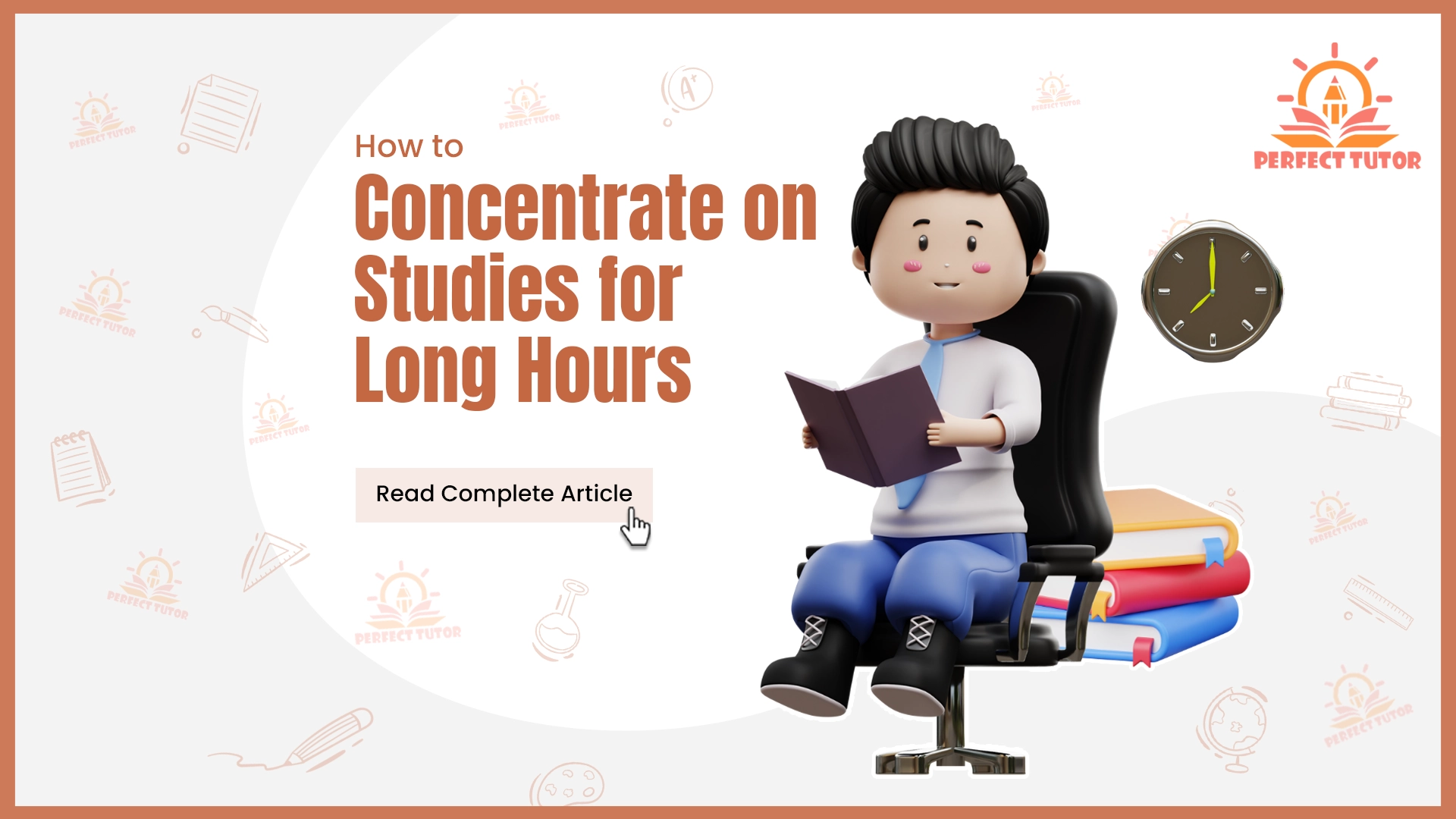How to concentrate on my studies for long hours
When we prepare for exams, Many times we are unable how to concentrate on our studies for long hours. We need to find effective ways to enhance concentration on our studies, manage our time well, and prolong our study sessions. One technique that some experts suggest is to study with short breaks in between, which can help us retain more information and squeeze more hours into our schedule without losing focus. To prevent getting bored while studying for long hours, we should ensure we have a calm and cosy place to work, take short breaks to refresh our minds, switch topics to keep our interest and reward ourselves with small incentives. Although sometimes we may have to study for long hours at a stretch, it is preferable to study in small chunks rather than cramming everything the night before a test. Below are some tips for how to concentrate on my studies for long hours.
1) Make study goals.
When we prepare for exams, we need to find effective ways to enhance our focus, manage our time well, and prolong our study sessions. One technique that some experts suggest is to study with short breaks in between, which can help us retain more information and squeeze more hours into our schedule without losing focus.
To prevent getting bored while studying for long periods, we should ensure we have a calm and cozy place to work, take short breaks to refresh our minds, switch topics to keep our interest and reward ourselves with small incentives. Although sometimes we may have to study for long hours at a stretch, it is preferable to study in small chunks rather than cramming everything the night before a test. Below are some tips for how to concentrate on my studies for long hours.
2) Create the most focused study environment.
Finding a peaceful place to study and concentrate on studies for long hours without distraction So, first, choose a place where you won’t be interrupted for a long time (or whatever your study time is), and then turn off all distractions. Play some soothing study music and begin. It is a common problem faced by students.
Example: If you are a student and live in a hostel, There are so many disappointments from your friends and other students. You should take room outside because, without concentration, you will be unable to achieve your goal.
3) Why Taking Breaks While Studying Is Good for You
Studying can be a demanding and exhausting activity, especially when you have to prepare for exams or complete assignments. You may feel tempted to study for long hours without stopping, hoping to learn more and faster. However, this may not be the best strategy for your learning and well-being.
- Taking breaks can improve your memory. When you study with short breaks in between, you allow your brain to consolidate the information you have learned.
- Taking breaks can boost your energy. Studying for long periods can drain your energy and make you feel tired and bored. Taking breaks can help you recharge your batteries and restore your motivation.
- Taking breaks can reduce stress. Studying can be stressful, especially when you have deadlines and expectations to meet. Stress can affect your mood, your health, and your performance.
4) Make your study sessions more fun.
Studying can be a tedious activity, especially when you have to deal with difficult or uninteresting subjects. You may feel like studying for hours without any breaks, hoping to learn more and faster. However, this may not be the best strategy for your learning and well-being.
There are many ways to make your study sessions more fun while still being productive and effective. Here are some of them:
- Listen to music. Music can help you relax and focus while studying. You can choose some instrumental or classical music that doesn’t have lyrics that may distract you.
- Study with friends. Studying with friends can make your study sessions more fun and social. You can share ideas, ask questions, explain concepts, and quiz each other.
5) Prioritise your tasks.
You should always be mindful of which concepts, topics, or subjects need more attention and rank them accordingly. Switch subjects every hour, every 45 minutes, or whenever you feel bored, and choose an interesting concept. You can always use a unique subject combination of related subjects or topics to enhance your focus and learning ability.
Example: Suppose your exam is in the coming days.
1. See your date sheet carefully.
2. According to the date sheet, prepare the subject.
3. Which topic is important and takes less time to prepare?
4, After preparing to remain.
6) When needed, take a nap.
Studying can be a tiring and stressful activity, especially when you have to deal with a lot of information and deadlines. You may feel like you don’t have enough time to sleep or rest, but this may not be the best strategy for your learning and well-being.
There are many benefits to taking a nap while studying, as long as you do it right. Here are some of them:
- Taking a nap can improve your memory. When you nap, your brain consolidates the information you have learned, making it easier to recall later. Studies have shown that napping can enhance your memory, concentration, and creativity while studying.
- Taking a nap can boost your energy. Studying for long hours can drain your energy and make you feel tired and bored.
- Taking a nap can help you recharge your batteries and restore your motivation. A short nap of 10 to 20 minutes can make you feel refreshed and ready to study again. Taking a nap can reduce stress. Studying can be stressful, especially when you have deadlines and expectations to meet. Stress can affect your mood, your health, and your performance.
- Taking a nap can help you relax and cope with stress better. You can use a nap to do something fun, enjoyable, or relaxing.
By taking a nap when needed, you can make your studying more effective and enjoyable while still learning efficiently and productively. So, next time you study, try to take a nap when you feel tired or overwhelmed, and see the difference for yourself!
7) Engaged rather than passive research
Benefits of Studying Longer
When you study for a longer period without interruptions, you are more likely to learn faster and remember information for a longer period. If you train your mind to focus for an extended period, your daily knowledge retention may improve. Longer hours will also give you more time to solve problems and identify weaker concepts that need to be improved. Better and more comprehensive learning is beneficial; however, you must avoid cramming the subjects. The quality of your study is more important than the number of topics covered.
The importance of Concentration during the study
FAQ
Q1 .How can I study 3 subjects in a day?
Ans. To do well in Biology theory, Chemistry revision or Physics problem-solving, you need to devote some time to each subject every day. You can study in short sessions of 45-60 minutes and take regular breaks to avoid losing concentration and interest.
Q.2 What is the best time for study?
Ans. The best times for study are 10 Am to 2 PM & 4 pm to 10 PM.
Q.3 How much sleep to Topper gets?
Ans. Many people think that toppers study for 15 to 16 hours and that they study very early and very late. However, every topper has always stressed how they get at least seven to eight hours of sleep.
Q.4 Is it good to study 3 subjects a day?
Ans. You can study better by switching between different subjects each day to keep your attention, instead of focusing on one or two subjects only.
Q.5 How can I enjoy studying?
Ans Follow these tips
- Enjoy some good tunes.
- Make it fun for yourself.
- Make it fun with others.
- Use fancy pens and paper.
- Try acting.



 +91 8700847275
+91 8700847275
 +1 8009616567
+1 8009616567